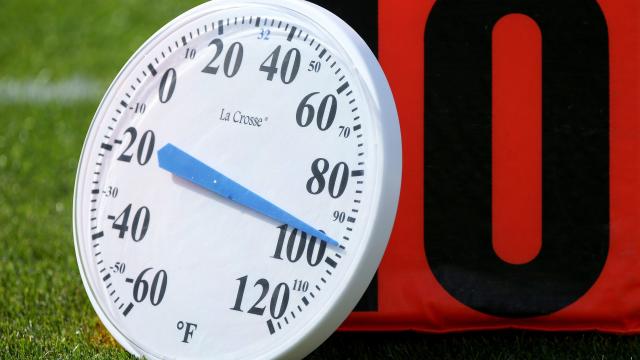Thermometers have been around in their modern conception since roughly the 17th century. But they are absolutely screaming evidence at us right now that something continues to be deeply wrong, just as they have been for a while now to anyone paying attention.
Soaring temperatures at Lambeau Field on 24 September 2017 in Green Bay, Wisconsin. Photo: Getty Images
The first week of autumn has shattered century-old heat records in multiple locations across the Midwest and northeastern US, according to Accuweather, with an ongoing heat wave not only resulting in “higher temperatures than those seen during astronomical summer, but also some of the latest 90-degree Fahrenheit temperatures on record in many locations”.
Tuesday was the seventh day in a row temperatures in Chicago soared to 32C.
“There has never been a heat wave of this duration and magnitude this late in the season in Chicago,” the National Weather Service wrote. “Chicago has never recorded 7 consecutive days with high temperatures 92F+ this late in the year. The previous latest streak of 4+ days in a row of 92F+ was Sept 16th-19th, 1955.”
“Niagara Falls, New York; Cleveland; Burlington, Vermont; and Madison, Wisconsin, have all experienced the highest temperatures on record for this late in the year,” Accuweather added.
In Cleveland, temperatures hit 34.4C on September 25, capping off record highs for the entire September 21-25 stretch. In Burlington, temperatures of 32.2C were recorded each day from September 24th-27th; the previous record for latest-season day to break 32.2C there was set on 16 September 1939.
Similar extremes were seen in Detroit, where temperatures hit a record for the date of 33.9C.
Tuesday marked the 6th consecutive day of record highs at Flint and Saginaw and the hottest day of 2017 at Detroit. #MIwx #nwsdtx pic.twitter.com/nDAZYIGFE8
— NWS Detroit (@NWSDetroit) September 27, 2017
“Many nighttime lows in the Midwest have been near or even above late-September average highs,” said AccuWeather meteorologist Matt Greene.
Rundown of the unprecedented heat wave, inc. #Chicago & #Rockford overviews, historical context etc. https://t.co/Kc6jZXtteV #ilwx #inwx pic.twitter.com/n41BPTznqd
— NWS Chicago (@NWSChicago) September 27, 2017
The good news, Accuweather reported, is temperatures are projected to plummet to more regular fall conditions by the end of the week in both the Midwest and further east.
Dry conditions over the past few weeks are likely playing a role in the elevated heat, per Accuweather, though Think Progress noted elevated levels of atmospheric carbon associated with climate change could be affecting the jet stream, causing “high pressure ridges that block or stall weather patterns”.
“It’s perhaps obvious that global warming means more frequent and intense heat waves,” Penn State climatologist Michael Mann wrote to Think Progress. “But what is less obvious is how climate change may be impacting the behaviour of the jet stream in way that causes more persistent weather extremes, giving us even more extreme and longer-duration heat waves than we would otherwise expect.”
Unsurprisingly, mountains of evidence suggest heat waves are linked to human impact on the climate. A recent study published by World Weather Attribution concluded the summer 2017 heat wave in southern Europe, dubbed “Lucifer” by some locals, was part of a climate change-induced pattern which has increased the chances of similarly hot summers in the region by at least tenfold since 1900.
